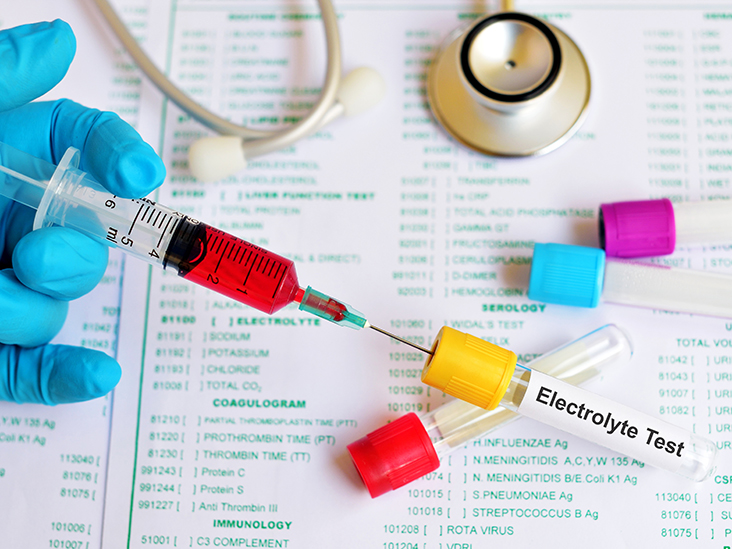Preventive Healthcare
Electrolytes Panel: Types, Normal Value, Procedure & Purpose
9565 Views
0

The electrolyte panel, also simply referred to as the electrolyte test, measures the levels of essential minerals in your blood. These minerals, known as electrolytes, include sodium and potassium. They play a vital role in maintaining the proper balance of fluids in your body and are essential for normal cell function. There are several causes leading to electrolyte imbalance. Let's take a look at a few of them.
What is an Electrolyte Panel?
An electrolyte panel, also referred to as an electrolyte test, is a blood test that measures the levels of electrolytes in your body. Electrolytes are minerals that play an important role in your body's functions, including muscle contraction, nerve function, and fluid balance. Your doctor may order an electrolyte panel if you have symptoms of an electrolyte imbalance, such as dehydration, muscle cramps, or irregular heartbeat. An electrolyte panel can also be used to monitor treatments for conditions that cause electrolyte imbalances, such as kidney disease or heart failure.
Causes of Electrolyte Imbalance
One of the most common causes of electrolyte imbalance is the loss of fluids in your body. A reduction in the fluid level of your body can happen for various reasons, like diarrhoea, vomiting, or excessive sweating.
Not getting enough nutrients from your diet can also lead to an electrolyte imbalance. Chemotherapy, consuming immunosuppressants, and certain antibiotics also disrupt the electrolyte balance in your body. Doing an electrolyte test can accurately confirm the electrolyte level in your body.
Different Types of Electrolytes
There are different types of electrolytes, each with its function in the body. The most common electrolytes are sodium, potassium, chloride, and bicarbonate.
Sodium is the most abundant electrolyte in the body and is responsible for maintaining fluid balance. It is also essential for conducting nerve impulses in your body and is responsible for the relaxation and contraction of your muscles.
Along with sodium, even potassium is important for muscle contraction, heart function, and maintaining the fluid level in your body. Chloride is involved in maintaining acid-base balance and fluid volume. Bicarbonate helps to buffer acids in the blood and tissues.
Procedure for an Electrolyte Panel Test
An electrolyte test is a simple and quick procedure that can be carried out at your doctor's office or a lab. A small amount of blood taken from your arm is sent to a lab for analysis. The test results will help your doctor understand how well your body can maintain fluid and electrolyte balance. However, it is imperative to choose a dependable lab for such tests since any mistake in the electrolyte panel test can provide you with an unreliable report.
Purpose of an Electrolytes Panel
The symptoms of electrolyte deficiency are not specific and can sometimes be vague. There can be other serious underlying illnesses that can be misunderstood as electrolyte deficiency due to similar symptoms. Taking an electrolyte panel can help you, as well as your doctor, understand the reason for the causal symptoms. If your doctor sees one or multiple symptoms indicating electrolyte deficiency, they might ask you to go in for an electrolyte test.
Who Should Get an Electrolyte Panel Test?
If you have any of the following symptoms, you may need an electrolyte panel test:
- Muscle weakness
- Confusion
- Seizures
- Coma
- Irregular heartbeat
- Numbness or tingling in the extremities
An electrolyte test can help determine if you have too much or too little of a particular electrolyte in your blood, helping you address the issue at the earliest.
When to Get an Electrolyte Test?
While most people will never need an electrolyte test, there are certain circumstances when it may be ordered by a doctor. If you are showing symptoms that appear to be because of an electrolyte deficiency, or if the doctor suspects a chronic, underlying condition, they may ask you to get an electrolyte test done. You may also be asked to get the test done if you're taking medications that can affect your electrolyte levels, such as diuretics or steroids. This is because your doctor may want to monitor you with periodic electrolyte tests to understand the effect of the medication and change it if needed.
Risks and Complications of an Electrolyte Test
An electrolyte test is a simple, non-invasive test that measures the levels of various electrolytes in your blood. While the risks and complications of this test are minimal, there are a few things that you should be aware of before getting the procedure done.
The most common complication from an electrolyte test, as with any other blood test, is bruising or bleeding at the site where the needle was inserted. This is usually not serious and resolves on its own within a few days.
Overall, an electrolyte test's risks and complications are minimal. However, discussing any concerns with your healthcare provider is always important before getting any medical procedure done.
Normal Values for an Electrolyte Test
An electrolyte test measures the levels of certain ions in your blood. These ions are important for many bodily functions, including hydration, muscle function, and heart function.
The normal values for an electrolyte panel may vary slightly depending on the laboratory that performs the test, but generally, the normal values for each ion are as follows:
- Sodium: 135-145 mEq/L
- Potassium: 3.5-5.0 mEq/L
- Chloride: 98-106 mEq/L
- Bicarbonate: 22-28 mEq/L
- Calcium: 8.5-10.5 mg/dL
- Magnesium: 1.7-2.3 mEq/L
- Phosphorus: 2.5-4.5 mg/dL
Conclusion
If abnormal values are recorded in your electrolyte panel test, you must follow up with your doctor. Electrolyte abnormalities can be caused by several conditions, including kidney disease, heart failure, and liver disease. Treatment for electrolyte abnormalities will depend on the underlying cause.
Metropolis Healthcare is one of the leading chains of labs with branches across India. Our expert team, scientific approach, and quick procedures make it easy for you to get a wide range of blood tests done at a reasonable price. Contact us today to learn about the wide range of tests we offer. For the best electrolyte tests, look no further than Metropolis Healthcare.























 WhatsApp
WhatsApp